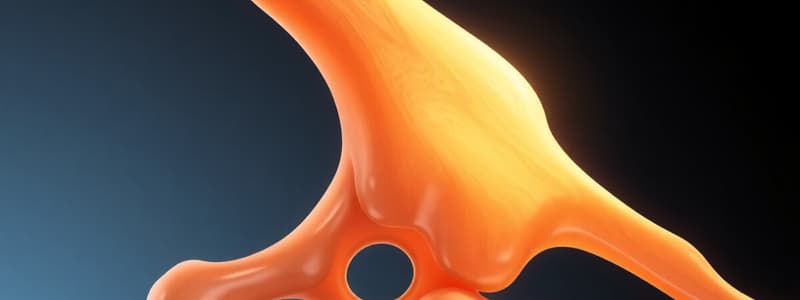Podcast
Questions and Answers
What happens to small vacuoles during the development of an univacuolar adipocyte?
What happens to small vacuoles during the development of an univacuolar adipocyte?
- They merge to form one large vacuole. (correct)
- They multiply to form several large vacuoles.
- They remain separate, maintaining their individual functions.
- They disappear without affecting cell structure.
What characterizes mature erythrocytes compared to leucocytes?
What characterizes mature erythrocytes compared to leucocytes?
- Mature erythrocytes do not contain a nucleus. (correct)
- Mature erythrocytes are larger in size than leucocytes.
- Mature erythrocytes contain multiple nuclei.
- Mature erythrocytes produce platelets.
What is the function of megakaryocytes in the bone marrow?
What is the function of megakaryocytes in the bone marrow?
- To secrete hormones related to blood cell development.
- To generate red blood cells.
- To produce platelets. (correct)
- To produce leukocytes.
What happens to the fat within adipocytes during tissue fixation?
What happens to the fat within adipocytes during tissue fixation?
Which type of blood cell plays an important role in blood clotting and is anuclear?
Which type of blood cell plays an important role in blood clotting and is anuclear?
What are the main components of the extracellular matrix in cartilage?
What are the main components of the extracellular matrix in cartilage?
Which type of cartilage contains a higher content of elastin fibers?
Which type of cartilage contains a higher content of elastin fibers?
What is the primary function of osteoblasts in bone tissue?
What is the primary function of osteoblasts in bone tissue?
What role do osteoclasts play in bone development?
What role do osteoclasts play in bone development?
Which type of cartilage is primarily found in joints?
Which type of cartilage is primarily found in joints?
What characterizes fat cells (adipocytes)?
What characterizes fat cells (adipocytes)?
Which component is responsible for the rigidity of bone tissue?
Which component is responsible for the rigidity of bone tissue?
How are chondrocytes characterized in cartilage?
How are chondrocytes characterized in cartilage?
Flashcards are hidden until you start studying
Study Notes
Cartilage
- Cartilage is a semi-rigid connective tissue with a high concentration of collagen fibers, particularly type II.
- The extracellular matrix also contains sulfated glycosaminoglycans (GAGs), contributing to cartilage's flexibility and resilience.
- Three main types of cartilage exist: hyaline cartilage, elastic cartilage, and fibrocartilage.
- Hyaline cartilage, located in joints, is the most common type and contains mostly type II collagen.
- Elastic cartilage, found in the ear, is more flexible due to a higher content of elastin fibers.
- Fibrocartilage, located in intervertebral discs, provides tensile strength due to a higher concentration of type I collagen.
- Chondrocytes, the specialized cells of cartilage, are visible under the light microscope as large, circular cells.
Bone
- Bone is a rigid connective tissue characterized by its calcified matrix.
- The matrix's rigidity is due to the mineral hydroxyapatite, closely associated with collagen fibers.
- Osteoblasts, responsible for bone formation, decrease in size during bone mineralization and become osteocytes.
- Osteoclasts, bone-resorbing cells, work together with osteoblasts to maintain bone structure and remodel bone tissue.
Fat Cells (Adipocytes)
- Adipocytes are mesenchymal cells specialized for fat storage.
- Fat, being water-insoluble, is stored within vacuoles in the cytoplasm.
- In developing adipocytes, multiple small vacuoles fuse, ultimately forming one large vacuole.
- The cytoplasm of mature adipocytes is reduced to a thin rim, containing the flattened nucleus and organelles.
- After tissue preparation, fat is washed out, leaving a seemingly empty, white cell with a nucleus at the periphery.
Blood Cells
- Blood cells are specialized mesenchymal cells with distinct forms and functions.
- There are two main types of blood cells: red blood cells (erythrocytes) and white blood cells (leukocytes).
- Erythrocytes, mature red blood cells, lack a nucleus.
- Leukocytes are responsible for the immune system's defense mechanisms.
- All blood cells are regularly replaced by new cells produced within bone marrow.
- Megakaryocytes, large cells found in bone marrow, produce platelets (thrombocytes).
- Platelets, like erythrocytes, are anuclear and play a crucial role in blood clotting.
Studying That Suits You
Use AI to generate personalized quizzes and flashcards to suit your learning preferences.


